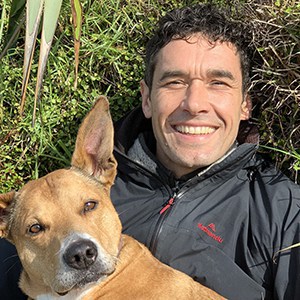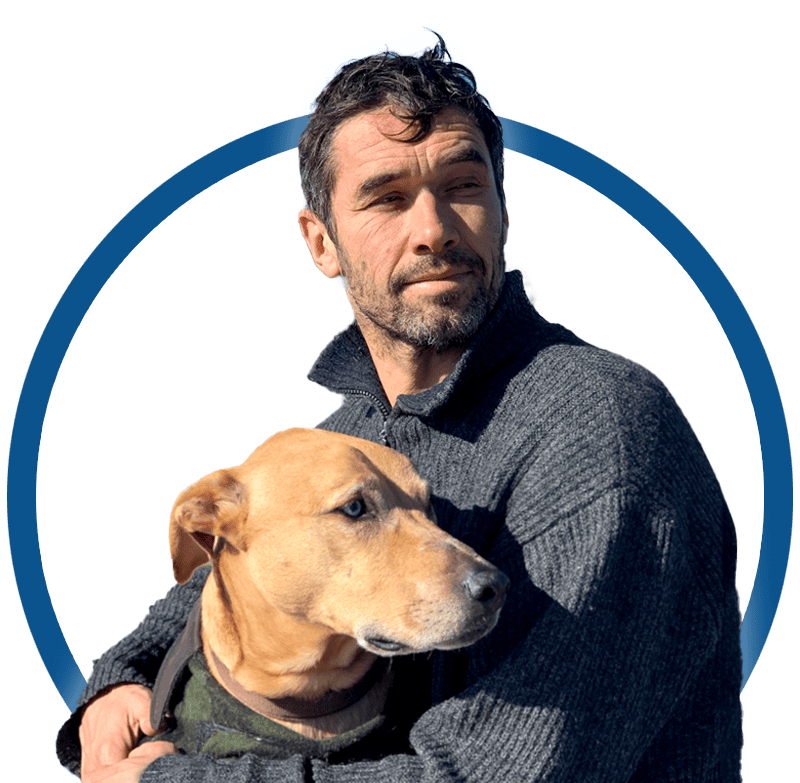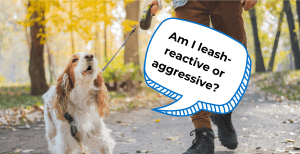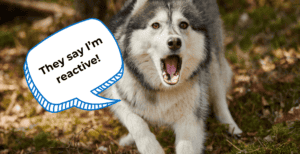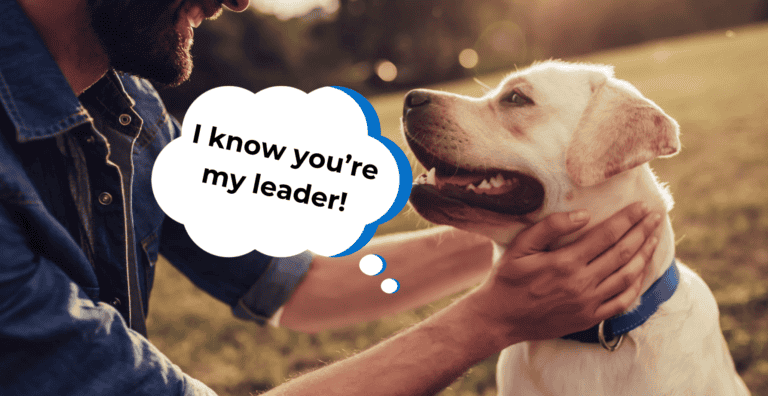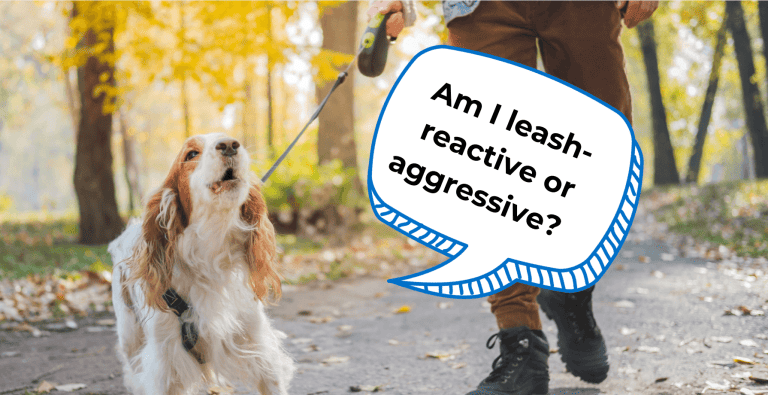Listen above or iTunes / Spotify (Tap the subscribe button – it’s free and keeps you updated!)
Today’s Guest
Kohl Harrington – Director of Pet Fooled
My guest today is the man who BLEW THE LID on the commercial pet food industry with his documentary film, Pet Fooled.
Kohl Harrington’s mission is to STOP THE ROT when it comes to our dogs’ health! For the past decade he has been studying the pet food industry, its regulations, and the role of the FDA, in the production and marketing of commercial pet food.
He challenges our assumption that, if a food is “regulated” then it must be healthy…. Well, cigarettes are “regulated” but we all know they’re not healthy.
Where do the ingredients come from that go into our dog’s food? How are these ingredients defined? For example, if it says “corn” does that mean it has to be “corn” as we eat it, or is it just the cob after the corn is processed off it for human use? Who makes these decisions?
Regulation states that no meat other than that obtained by slaughter may go into the product, but if that’s the case, why does the EUTHANAZIA DRUG keep showing up in pet food? It begs the question: Are the regulations being enforced?
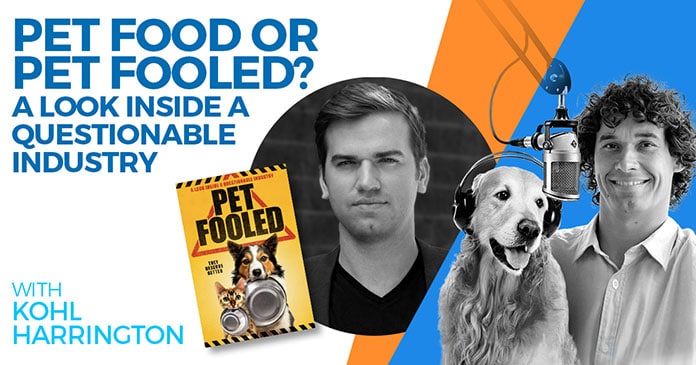
For the sake of your pet, and your peace of mind, tune in to today’s eye-opening podcast. Let’s all learn how to make better choices for our dogs!
You’ll Hear About
- [01:30] The lives of dogs in Mauritius and why Nathalie’s work is so important
- [02:00] Pet Fooled – the documentary
- [07:10] What’s really in our commercial dog food
- [09:00] Where the FDA comes in, and where food labels are misleading us
- [10:30] How the euthanization drug keeps showing up in pet food
- [14:00] If pet food is really “balanced”
- [18:30] Where you can learn more about feeding raw, and what’s going on with the regulations and oversight
- [23:00] Government decisions and definitions being made in secret from the public
- [26:15] The power of switching to a raw diet
- [29:00] How to choose a better food for your dog
- [32:00] Preservatives that keep pet food “fresh” for 25 years are also making dogs sick
- [39:30] Considering where our foods, and our dogs’ foods, come from
How You Can Get Involved:
Sign up to Kohl Harrington’s new course to learn more about this!
Join the movement to raise healthy happy dogs, instead of lining the pockets of rich Pet Food executives!
Links & Resources
- Pet Schooled
- Facebook: Kohl Harrington
- Facebook: Pet Fooled
- YouTube
- Twitter: Pet Fooled: @PetFooled
Pet Fooled Trailer
Learn more by tuning into the podcast!
Thanks for listening—and again, don’t forget to subscribe to the show on iTunes / Spotify to get automatic updates.
Cheers,

~Doggy Dan 🙂
|
Voiceover: |
Welcome to The Doggy Dan Podcast Show, helping you unleash the greatness within your dog.
|
|
Doggy Dan:
[00:00:30]
[00:01:00] |
Hello, everybody. Today, I'm so excited. I have Kohl Harrington with me today on the podcast who is the director of the movie Pet Fooled. So for those of you who watched the movie, you will know that it blew the lid on the commercial pet food industry in 2016. That movie really, for me, it was like a voice for the dogs. Kohl was speaking out for all those animals, especially dogs that don't have a voice, that can't speak, and he was almost talking like saying, “This is what we really think of the food you give us.” Then, he was looking at the science behind it. “This is what is really in this dog food,” and then he went into what really should be, what would be good to have in the dog food. It's just a fascinating movie all around, if you haven't seen it. He's with us today. He's involved in another… What do you call it? Project, film that's absolutely fascinating and potentially bigger than the first. Kohl, wonderful to have you with us today.
|
|
Kohl Harrington: |
Thank you. Thank you. Thank you. I wish I could be there in person in New Zealand, but this will do.
|
|
Doggy Dan: [00:01:30] |
Yeah, yeah. Oh, well, it's great. It's great to have you here, and I thought we'd start off by… A lot of people have seen the movie. They’d love to hear just your voice and summary about it again. I'm sure they're remembering going, “Hang on, that's… Which one was that? That's a great movie, but just remind me of it.” For those people who have no idea what we're talking about, Pet Fooled, the movie. Can you give us an idea of maybe some of the big pieces that came out, the big things that you remember that shocked you most as a director making that movie and a bit of a summary really for those people?
|
|
Kohl Harrington: [00:02:00]
[00:02:30] |
Sure. Well, Pet Fooled is… It's a feature documentary. It's a quick 71-minute, and it's a look inside the commercial pet food industry. The in film today is a representation of what I went through and learned looking into the pet food industry for the first time. I believe the film, the in film that we have, now that everyone can watch, if anyone wanted to look into the pet food industry, I believe the film is completely representative of what anyone would find. So it's catching people up to speed. |
|
[00:03:00] |
But the other aspect of the film that I was surprised at was doing all of this research into what dogs and cats eat, led about the question of, “Well, what should dogs and cats eat?” It's a question I've never really thought about. I've never really thought about what I should eat as a human, what's most appropriate for me, what's less appropriate for me. So one of the things I was fascinated to learn about is that every species has a diet that is their species' appropriate diet. |
|
[00:03:30] |
One of the veterinarians in Pet Fooled brilliantly explained how earthworms eat dirt and how hummingbirds eat nectar, but you don't see nectar to an earthworm or dirt to a hummingbird. It just doesn't work. Those animals would die. But the problem in the pet food industry and the big question is you can feed things that are not most appropriate or argued to be not most appropriate for dogs and cats, and they're not dying overnight.
|
|
Doggy Dan: |
Mm, exactly. |
|
Kohl Harrington: |
It's similar to us humans where problems may, or may not, or may occur over time.
|
|
Doggy Dan:
[00:04:00] |
Yeah, and I think that, for me, was a huge part of it that… It's so obvious that dogs can't speak English. They can't say, “You know that food that you keep giving me night after night after night, it actually gives me a sore tummy, and I'm feeling rundown. I don't have much energy. I think I may be growing a tumor.” They don't have a voice like that. So they really do eat stuff which might not be good for them. Is that fair to say? |
|
Kohl Harrington: |
Yeah. One of the other analogies that I liked and even with new research and projects that I do now, this analogy is coming back where doctors used to recommend smoking. |
|
Doggy Dan: |
True. |
|
Kohl Harrington: |
But, now we know smoking eventually will most likely cause cancer and kill you. |
|
Doggy Dan: |
Yeah. |
|
Kohl Harrington: |
This sort of concept that the pet food industry runs off that I've learned is, “Well, it's not hurting them overnight, and they can live years and be fine,” and that sort of question of, “Will it cause disease similar to how cigarettes cause disease for humans?” That's the sort of question that's… |
|
Doggy Dan: |
Totally. |
|
Kohl Harrington: |
The big question in the pet food industry still. |
|
Doggy Dan: [00:05:00] |
I mean, I was reading somewhere that the number of dogs who are now dying of cancer is through the roof as a percentage. |
|
Kohl Harrington: |
It's not being looked into by the people that are supposed to regulate the industry.
|
|
Doggy Dan: |
No. No, and it's something like… It's over 50%, I believe. Does that sound about right? |
|
Kohl Harrington: |
I always see estimates around 50% for that. Yeah.
|
|
Doggy Dan: |
Yeah. |
|
Kohl Harrington: [00:05:30] |
One of the other big things I've learned since releasing the film is how regulation… People always will go to that concept of like, “Is it regulated?” or, “Are you following regulation?” Similar to what we were just talking about, just smoking and smoking causing… I mean, cigarettes are regulated, but does that mean cigarettes are healthy? |
|
Doggy Dan: |
Yes. |
|
Kohl Harrington: |
I think we would all argue cigarettes are not healthy. |
|
Doggy Dan: |
Yeah. |
|
Kohl Harrington: |
So regulation really doesn't have anything to do with guarantee of health or lifestyle. |
|
Doggy Dan: [00:06:00] |
Yes, yes. I think the thing is when 50% of dogs are actually dying of cancer, we really should be stopping and saying, “Hang on.” I mean, there's no other species out there. It's not like if you're looking at birds, or fish, or elephants, or any of these animals, none of them are dying 50% of cancer. It's insane. |
|
Kohl Harrington: |
Mm-hmm, and they're not… The elephants and the birds are not eating this complete and balanced food that is most likely to be runoff or waste from the human food industry. |
|
Doggy Dan: |
Yes. |
|
Kohl Harrington: |
From the human food industry, so. |
|
Doggy Dan: |
So tell us a little bit about that. We don't want to go into all the gory details, but some of that stuff was just shocking for me, and I think it'd be good for people to have a bit of a wake-up call at the beginning of this just to go. We're not… Yeah. |
|
Kohl Harrington: |
Yeah. |
|
Doggy Dan:
[00:07:00] |
We're not talking about dogs not getting their favorite meal. It's not like we're going, “Oh, I wish today I'm getting macaroni cheese, and I really wanted meatballs.” We are talking about the equivalent for dogs, that they are being given stuff which is just horrendously bad quality, poisonous almost to some of them, and yeah, they're getting stuck with that stuff. So can you give us an idea of some of the bad stuff? Yeah. |
|
Kohl Harrington:
|
Sure. I mean, the pet food industry, there's such a range of… You could have the best ingredient ever to what many would argue would be scary ingredients. But the pet food industry, these people that create the regulations and the people that put the foods out, they would have you, or may want you, to believe that everything is good. There is no such thing as a potentially bad ingredient. What I mean is, it's approved by this organization that is not public. |
|
Doggy Dan: |
Totally. What sort of things? What sort of things? What sort of things? |
|
Kohl Harrington: |
Sure. |
|
Doggy Dan: |
Yeah. |
|
Kohl Harrington:
|
You can have anywhere from… Like if you read on the package, it shows, “Meat and bone meal.” So you can have corn. There's no guarantee of quality. So you can have a product that comprises of corn, wheat, with no idea the quality of that corn or wheat is. It may not be the same type of corn you and I get. |
|
Doggy Dan: |
In what sense because that's what people… In what sense can you have low… What does low-quality corn and wheat mean? |
|
Kohl Harrington: |
Well, the big question is, “What is this corn and wheat? If you say you have corn and wheat, is it just corn and wheat, or could it be all of the runoff after human corn is processed? So is it just a shuck and then it's labeled as corn?” So there's all of these questions there.
|
|
Doggy Dan: |
Oh, you mean it's chuck. Sorry. I think it might have been American to… Did you say chuck, shuck? |
|
Kohl Harrington: |
Shuck.
|
|
Doggy Dan: |
Shuck? |
|
Kohl Harrington: |
I'm calling it a shuck or just like after the corn is taken off the cob. So cob would be another word for it, so. |
|
Doggy Dan: |
Got you. Ugh, so it's like the corncobs almost? Just that? |
|
Kohl Harrington: |
Well, all of these ingredients are in a book. So they're supposed to follow what that ingredient is defined as. |
|
Doggy Dan: |
Yeah. |
|
Kohl Harrington:
[00:09:30] |
Now, I don't know of a regulator being at these plants 24/7, or I don't know of regulators having the ability to test and say, “Actually, you do have 30% meat and bone meal.” But I think the scariest things that I found that can go into the food is, according to federal law here in the United States, animals that have died other than slaughter are not supposed to be deemed fit to be put into pet food. But a loophole to that was the FDA had come up with a compliance policy opinion. So basically, the FDA was saying, “Hey, we have the ability to regulate pet food. That's what we're tasked with. This is illegal. You can't use animals that have died other than slaughter.” |
|
Doggy Dan: |
Yes. |
|
Kohl Harrington: |
So technically, you can't use roadkill, right? |
|
Doggy Dan: |
Yeah, got it. |
|
Kohl Harrington: |
Or something washed up at the beach. |
|
Doggy Dan: |
Yeah. |
|
Kohl Harrington: |
A dog and cat maybe got euthanized at the shelter, right? |
|
Doggy Dan: |
Yeah. |
|
Kohl Harrington: [00:10:00] |
Now, what happens when the dog and cat is euthanized at the shelter, or something is washed up on the beach, or it's roadkill? I mean, these are animals that have died other than what is deemed to be inappropriate slaughter. They're all collected. They're all rendered together. Who knows where that stuff is going? There's no chain of custody. |
|
Doggy Dan: |
Oh, I see. So… |
|
Kohl Harrington: [00:10:30] |
To prove or disprove what is going where, and so the FDA will step in and say, “Hey, we have a compliance policy saying we're not going to enforce this law that says you can't use animals that have died other than slaughter.” So technically, they can. So they'll say, “Oh, no. It's illegal.” Yeah, it is illegal, but the FDA is not going to enforce that regulation, if that makes sense. |
|
Doggy Dan: |
Wow. |
|
Kohl Harrington: |
I jumped all over the place there.
|
|
Doggy Dan:
[00:11:00] |
Yeah. No, it totally makes sense. So basically, in summary, animals that are euthanized at the shelter, animals that are washed up dead on the beach, roadkill is not officially allowed into dog food. However, nobody is tracking and tracing to make sure it doesn't go there. Effectively, it could go anywhere and could end up there. |
|
Kohl Harrington: |
This is what really started the film. A few things started the film, but the main thing is that the euthanization drug keeps showing up in the pet food. So yeah, they had that. They still have that as a problem, and the FDA admits. Yeah, it's a problem. It shows up in the pet food. |
|
Doggy Dan: |
Wow. |
|
Kohl Harrington: |
They're not reporting, “Well, where does it come from?”
|
|
Doggy Dan: |
Yeah, and I guess this is not just some small brands. Some pretty big brands end up with this euthanizing drug. |
|
Kohl Harrington: |
It has been in a variety of smaller brands, bigger brands over the past few decades. It will pop up depending on if they want to test for it. |
|
Doggy Dan: |
Well, that's it. If you test, you'll find it. If you don't test, you don't find it sort of thing, so…
|
|
Kohl Harrington: |
Yeah. |
|
Doggy Dan: |
Yeah. |
|
Kohl Harrington: [00:12:00] |
The past few cases with that was only tested because an animal had died, and then when the animal died, then it was discovered, “Oh, there were high levels of…” It was supposed to be, or the allegation was, that it was horse. So this company was saying they had organic beef, and they labeled the product “Organic Beef,” and had a sticker saying that, like an official government sticker. It turned out not to be organic beef. It was horse. |
|
Doggy Dan: |
Wow. |
|
Kohl Harrington: |
Which is not an allowable ingredient that I know about, unless it's under that meat and bone meal. It slipped through. |
|
Doggy Dan:
[00:13:00] |
Totally. I mean, one of the tricky things with dogs is, as we know, dogs will eat anything. They literally eat other animals' feces for goodness’ sake. So they're just monsters when it comes to eating, and they will eat anything, even if there's a tiny bit of goodness in there regardless of the fact that there is some terrible, terrible other stuff in there. So we almost have to be the ones who are monitoring their food. Yeah. That's the summary, guys, of Pet Fooled very, very quickly. Thanks for that.
|
|
[00:13:30] |
Wow. It got me going again thinking, “Yeah, man.” The other thing, of course, which I just want to touch on, is I always look at the similarities between dogs and people, and one of the similarities that I always think, which… It annoys me because I just think… Can you imagine if somebody controlled your food, and they said, “Oh, Dan likes to eat the same every single day, and he wants to eat that same meal. Tuna and pasta. That's all he needs. He doesn't need anything else. Tuna and pasta is the perfect food for him. Don't ever feed him anything ever again?” Can you imagine how annoying that must be and I think for those poor dogs who are fed the same meal every single day their lives because somebody came across? What's your take on that? |
|
Kohl Harrington: [00:14:00]
|
I mean, I think that that is one of the… If that didn't exist, I don't think the pet food industry and a lot of foods that are on the market would technically exist. So what is fooling the consumer is that concept that they're not stating it, but it's alluded to that if you do not feed a complete and balanced food, is it completely balanced? Do you know what complete and balanced is? It's not demanding to the pet owner that you will murder your animal, but people have this concept of like, “Oh my gosh, I have to feed this complete and balanced food every single meal.” |
|
Doggy Dan: |
Yeah, and the crazy thing is actually, if you think about complete and balanced, that's like saying, “You have to give your children a complete and balanced meal. You should. You have to feed them that. Therefore, feed them sausage and chips, and a little bit of salad every single day for the rest of their life.” |
|
Kohl Harrington: [00:15:00] |
What they're trying to say with complete… Yeah. I mean, the concept of dogs and cats needing their vitamins and minerals throughout X amount of time in their life is completely valid. We want to make sure that we humans are getting the nutrients that we need. Otherwise, we'll get a nutrient deficiency. So the concept of trying to mitigate a nutrient deficiency, totally fine. |
|
Doggy Dan: |
Yes, totally. |
|
Kohl Harrington: [00:15:30] |
But it slipped into “has to be completely balanced”, “has to meet these nutrient profiles,” and that's elusive to the end user, and they'll think, “Oh, well, it meets the nutrient profiles.” Well, it goes back to that smoking analogy, but does it mean over the course of the animal's life, that animal will not develop cancer from eating this food? Does it mean that an animal will not get diabetes from the high amounts of sugar? |
|
Doggy Dan: |
Yeah. |
|
Kohl Harrington: |
That's when the industry will say, “Well, that's your decision to figure out. As the pet owner, you have the responsibility.” |
|
Doggy Dan: [00:16:00] |
Yes. Of course, you're also getting a better balance I think when you're actually mixing it up. There are certain things. For example, if you think of the human food, there are certain things in a tomato that you cannot get anywhere else other than in a tomato. |
|
Kohl Harrington: |
Mm-hmm (affirmative). |
|
Doggy Dan:
[00:16:30] |
That's a quality that is in a tomato or “tomato,” I should be saying for the American listeners. So tomato. Literally, there's things in tomatoes that you can only get in tomatoes.
So Kohl, that's Pet Fooled. I loved chatting about that. However, you have moved on obviously from then. Time has gone by. What are you on to now? What's your plans? What have you been working on? Yeah. You've got a new film in the making potentially, possibly? Tell us about that. |
|
Kohl Harrington:
|
I moved on, and I've been trapped in this topic. I had another filmmaker reach out to me the other day, and she was saying, “Hey, I'm going to be looking to do a film about the pet food industry, but you've done one. You're doing another. So what can I figure out how not to repeat what you're doing?” |
|
Doggy Dan: |
Yes. |
|
Kohl Harrington: |
I joked with her. I'm like, “Listen. This is like a vortex. It will suck you in, and you'll never be able to leave the topic.” After the film, I started… I made the film for next to nothing and had no marketing budget. |
|
Doggy Dan: |
Wow. |
|
Kohl Harrington: [00:17:30]
[00:18:00] |
Luckily, word of mouth allowed this. I mean, it went global and went on to platforms such as Netflix, which helped it get the word of mouth better. But after the film, I continued filming because there were a lot of questions still with how the FDA here in the United States was going after, for lack of a better term, world pet food companies. So there were a lot of questions there, and so I was able to be, I guess, in the right place at the right time. This new film that I've been documenting for for at least, I guess, four years now, I've been able to document a lot of stuff in real time. So there have been government inspections that have occurred, and I have been able to pop into the government inspection and film it, which I don't think has ever been done before. I've been able to film the government, then turn completely, I'm going to say, unprofessional or into a harassment intimidation manner. “You can't film this. You can't do that.” |
|
Doggy Dan: |
Wow. |
|
Kohl Harrington: [00:18:30]
|
It started like, “What is wrong with our government, where here in the United States, we're government by the people?” But what I'm finding in this new film is that the government wants to be more tyrannous and say, “This is what we believe and what we're doing, and we don't care what you… We don't want to have a conversation with anyone about what we're doing.” But what I've been able to document over the past few years is the government trying to regulate by their opinion, and it's been fascinating. Other than that, I did do a spinoff called Pet Schooled, petschooled.com, and that sort of… Different courses to teach pet owners. ” If you're new to a fresh food diet, well, these are some of the things you might face.” |
|
Doggy Dan: |
Great. |
|
Kohl Harrington:
[00:19:30] |
Or, If you have a question about the government regulating by opinion and you want to understand how that works, well, we have a course here for you, which is completely different from the movies. You can only cover so much in a movie, so Pet Schooled is where all of this continues. The thing I love about all of this is that this can be an analogy for so many, if not almost all industries. It's about politics. It's about how a law is passed, and how regulations come to be, and how corporations can have a massive influence in there. Completely fascinating stuff.
|
|
Doggy Dan: [00:20:00] |
Yeah. I think that's what a lot of people don't realize, that the pet food industry is headed towards a $30 billion a year industry by 2022. So like I said, these are massive, massive organizations, which are putting in the legislation and doing the checks and stuff. That's why we need people like you, and so it's just brilliant. I so appreciate what you're doing, and especially, yeah, I had a look at Pet Schooled, and it looks great. I'll put the links all on our page, but Pet Schooled is definitely for those people who want to know more, who are fascinated, who want to learn, and maybe teach other people and share. So petschooled.com. It looks great. |
|
Kohl Harrington: |
Thank you. Thank you. |
|
Doggy Dan: |
Okay. So yeah, FDA regulation, laws, processes. Wow, it's a lot of stuff, but we were chatting earlier, and you're saying there's almost… The concern is that some of the bigger organizations are effectively regulating themselves to a degree. Is that what's starting to head towards if we're not careful? Is that what you're saying? |
|
Kohl Harrington: [00:21:00]
|
Yeah. Well, there are a lot of arguments, and there have been, throughout the years, where people have argued that the pet food industry is basically self-regulated, and they would scoff at that, “What do you mean?” So the interesting thing here is that what is happening in the United States from what I see hass really reverberated around the world. So it's not just happening in the United States, and that's because these are global companies. It's M&M, Mars, it's Nestle Purina… I mean, these are massive food companies, and this pet food market is an offshoot of that to a certain degree for them. |
|
[00:22:00]
[00:22:30] |
So a lot of times, I mean, they're not just creating these top-of-the-line products or ingredients just for the pet food industry. You have influences of, “Well, this is the leftover stuff from us producing X, Y, and Z for human foods. So instead of getting rid of that, we're just going to find an avenue for it.” That's an interesting conversation as well, but all of these companies go to what is called an AAFCO meeting, the American Association for Feed Control Officials. So that is where all of these state departments of agriculture come together as well. So here in the United States, if you sell in one state and only in that state, then you have to adhere to the regulations in that state. But if you make your pet food product in one state and then ship it to another state, then you're in what is called Interstate Commerce. The states, although an interesting concept said, “Well, let's get together and have commonality about, like, if you sell a product here and it goes to another state as well, then we can just have the same sort of feed definitions,” for example. |
|
Doggy Dan: |
It makes sense. Yeah. |
|
Kohl Harrington: [00:23:00]
[00:23:30] |
Okay. It makes sense. Totally. Well, the FDA gets involved, and they start going into these AAFCO meetings. So this has been going on for over a hundred years, I believe, at this point. So the concept is fine, right? Well, here's the problem. If I want to make a pet food product, let's say, in the state of Illinois, Illinois puts in their law that you must define your definitions as per what AAFCO states. So we in Illinois have adapted the AAFCO definitions. Well, since they have adapted these feed definitions into their law, that should be public information. Before they adapt anything into their law, it should be open to public comment. It should be discussed. There should be signs. There should be all of this stuff happening, right? |
|
[00:24:00]
[00:24:30] |
Well, what I've been able to find is that all of these state departments go to AAFCO. Making the feed definitions is the Pet Food Institute, which was a lobbying group right next to the FDA, which is right next to that rendering association. So the rendering association and the pet food lobbying groups have large amounts of influence in my opinion when it goes to this, but it's all a private meeting. So you would have to pay $550 to go to this meeting that is technically a regulatory meeting where they're creating these feed definitions that are then adopted into law. They're also there creating what they call a Model Bill. So they created this Model Bill. So all of these public employees, federal and state, are creating Model Bills with corporations that are then copywritten, and the states can then take aspects of that model bill and put it into their state feed regulations, if that makes sense. |
|
Doggy Dan: |
Yeah. |
|
Kohl Harrington: |
It's very, very weird to go there and see the companies that are supposed to be regulated basically writing the regulations. |
|
Doggy Dan: |
Yeah. |
|
Kohl Harrington: |
I mean, I'm not saying companies shouldn't have a voice, but what I'm saying is that citizens should be able to go to these meetings without the expense of $550. |
|
Doggy Dan:
[00:25:30] |
Yeah, and if we come back to… It's a $30 billion a year industry. So the impact and the influence these huge organizations and companies can have over the regulatory organizations is massive. Of course, they're deciding effectively whether to make money, or feed the dogs what's good for the dogs. That's what this is really about. |
|
Kohl Harrington:
[00:26:00] |
Influence can work in so many different ways. What I was able to see throughout the years and what I've been documenting is the FDA… So after Pet Fooled came out, prior to Pet Fooled coming out, the grain-free industry was starting to become a threat to the big status quo players to the point to where even in the first film, Hill's Science Diet, who loves their grains and advocate for it and how they are a good thing, had to come out with a grain-free food. I mean, that's how threatening this grain-free marketing became for the status quo. They were bashing them, but having to come out with their own version of it. |
|
Doggy Dan: |
Their own product. Yes. |
|
Kohl Harrington: [00:26:30] |
Okay. So that was a threat, and raw foods started to pick up. So this commercial raw food industry started to take off because, duh, it's common sense, and for the most part, it's results-driven. I have met so many people throughout the years that are like, “I just switched food to a fresher food, and four out of seven problems I was having went away. Okay.” |
|
Doggy Dan:
[00:27:00] |
Yeah, yeah. I laughed because I'm looking at grain. I'm thinking grain food, grain-free food, and raw food, meat. I often think people… It's not that complicated. I mean, whilst dogs don't know… they'll eat almost anything. They still have that preference, I believe. I've never done this, but something I really want to do is put down maybe just three bowls. One's got meat, one is grain-free, and one is a pile of grain. You just watch which dogs go and eat the grain. It's so basic at a very simple level. The meat is, in my opinion, pretty much… They need a lot of that meat. They love it, and it comes back to some pretty basic stuff here. |
|
Kohl Harrington: |
It is, but through this AAFCO organization, they've created this perception that like pet food is rocket science and humans can't make that choice for themselves. They need this scientist to do it because… I have had so many veterinarians over the years like, “Who are you?” |
|
Doggy Dan: |
“Who are you?” Yes. |
|
Kohl Harrington:
|
Well, I'm someone who spent six years of my life looking into this probably to a deeper degree than any veterinarian or most veterinarians ever looked into actual processed pet foods. Interesting how so many doctors are prescribing dry pet foods to their dog and cat. It's a processed food. You're prescribing it? It's very weird.
|
|
Doggy Dan:
|
We do. We get caught up in… I mean, I'm all for science, and yet, at the same time, I don't want a scientist making my food that I eat. I don't want corporations, which are there to make money, making my food. I want to be eating fresh food, and the best meals are nearly always those ones which have that fresh produce, which hasn't been tampered with, which hasn't been manufactured and made. The most healthy food I should probably say because it's not always the best [most tasty]. Yeah. |
|
Kohl Harrington: |
I'm not arguing that some of these bigger companies are doing a version of science, but it's their version of science looking into what they want to sell. It's not the whole overarching be-all-and-end-all aspect. |
|
Doggy Dan:
[00:29:00]
|
Yes. Yes, yes, yes. Yeah. So for people who are going, “Okay, okay. I need to check my food. I'm concerned. I don't know what I'm feeding my dog,” where can people start? I mean, I always love this… For example, I think it was in the movie they mentioned it. “Just start reading the ingredients on your dog's food. If you can't pronounce half the words or you've no idea, you probably should start being a little bit concerned or at least start looking up some of them,” because I know I looked at one bag of dog food, and literally, every word on there had about 25 letters that I could hardly pronounce, and it was very concerning. There's only a few words I actually recognized. I mean, people can look at the ingredients and the brand now, but where do they go next? What can people do to make sure they're feeding their dogs good stuff? |
|
Kohl Harrington:
|
Well, the number one thing I'll tell anyone is, don't stress, because people… You'll have different kinds of people react different ways, but some people might watch Pet Fooled and be like, “God, I feel guilty.” We all go through that because what I'm trying to get across to people is that this topic, it sounds silly, but it's really in-depth. You could spend years looking into this stuff, and it's overwhelming, and it's angering, and everything. Right? |
|
Doggy Dan: |
Yes. |
|
Kohl Harrington:
[00:30:30] |
What I'm trying to get across to people as well is that it's actually easy, so like, “Why are you feeding your dog, for example…” I mean, I don't want to leave cats out as well, but. “Why are you feeding your dog just something from a bag? What's causing that? Why? Is it because you've just always done it? Is it a part of our culture? Why can't you do that yourself?” The good aspect is everyone can learn how to do this themselves if they want. If you don't ever want to make your pet's food, that's totally up to you. But if you want to… people… You'll get challenges left and right. You might not formulate it right. You might not do this. You might not do that. But you can learn that. If they're saying the food must be complete and balanced, then just learn how to make it kind of complete and balanced. Learn how to do that. It's not impossible to do. |
|
Doggy Dan: [00:31:00]
|
I did make my own dog food for a while. It took a little bit of time, and it was interesting. What blew me away was actually how it didn't cost that much money. It's really interesting. I was going to the butchers or just getting stuff from the local supermarket and grocery stores some of the cheaper cuts of meat. Yeah. You could tell my dogs absolutely loved it, but again, it had that fresh feel to it. Yeah. When I looked at how cheaply I can actually feed my dogs from making the food, it actually made me wonder, “Well, what's in the bag?” because the bag was costing it absolute fortune compared to what it actually cost me to feed them. |
|
Kohl Harrington: |
That's interesting for people to know as just… People have to make their own choice for their own lifestyle, but again, it's like, why are you buying that bag? Are you buying that bag because it's convenient, and you know it, and that's the reason why you're doing it, or are you buying it because you think you can't… only the dog food makers can make pet food? That's not true, so. |
|
Doggy Dan: [00:32:00] |
Yeah. I mean, one of the things about some of these bags as well it sits on the shelf. The shelf life of some of these products is insane because of the preservatives that's in the food. Is that a fair comment? |
|
Kohl Harrington: |
Oh, yeah. Yeah. It's shocking how… |
|
Doggy Dan: |
What is the shock part of some of them? I heard some I think in one of the movies. |
|
Kohl Harrington: [00:32:30] |
Well, they range depending on the preservative. I know in the movie, we had a woman. She got into this topic because she had an issue with her animal, and then she started looking into the preservatives I believe in the film. It's been a few years since I've actually watched the movie last, but I think it was like 25 years or something, the food would stay fresh on the shelf. |
|
Doggy Dan: |
I remember that. Yeah. That's the one I'm thinking. The lady said, “Oh, it can't be our food. Our food won't have gone off because it's got a shelf life of…” I think it was 25 or even 35 years. |
|
Kohl Harrington: [00:33:00] |
25 years. That was a scene every time we did theatrical stuff here in the States and any time I would be in a theater with a group of people, that would be the one scene every audience would just go, “Uh.” |
|
Doggy Dan: |
Yes. |
|
Kohl Harrington: |
Wow. Shocking. |
|
Doggy Dan: |
It is shocking because this is where if we go back to it, we all know, I think, or hopefully, we should know that, yeah, dogs do like… They like eating meat, and so how… If this dog food has got meat in it, how can you have meat sat on a shelf for 25 years and still be edible? I mean, that's insane. |
|
Kohl Harrington:
[00:34:00] |
One of the things I’d like to cover, and I don't think I have, is when I first started looking into this topic, I remember going to the pet food stores and sitting down and copying the labels, and thinking, “Well, what is the problem? It says corn. It says wheat. It says meat byproduct meal. It seems to be clear.” So it took a good few years of just looking down different avenues. One was coming across that AAFCO book and seeing what people could get away with in regards to pictures, and labels, and claims. So that was the first big eye-opener. |
|
[00:34:30] |
But the other big eye-opener was I had met with a few different veterinarians, and they're all advocating for… They would say raw food diet, and I was so confused. I'm like, “I've never heard of a raw food diet. What is that? I've heard of dry. I've heard of canned. What is a raw food diet? Is that like a chicken from the supermarket?” After spending years themselves, they were laughing at me at that point like, “Oh, no. You don't just get a chicken breast. You've got to meet the nutrient requirements, so it's more than just chicken breast.” |
|
[00:35:00] |
But I remember in the very beginning of making Pet Fooled, the guy I made it with, a friend of mine, we looked at each other, and we're like, “How are we going to go to a dog park and say, ‘Did you know that you should be feeding your dog a raw food diet?' We're going to get laughed at and people are going to roll their eyes. Whatever.” So when I came out with the film, I was so worried because I'm like, “I think I've wasted five years of my life because who is ever going to believe that a dog should eat an unprocessed diet?” But isn't that such a silly question to even have like, “Why am I sitting here thinking it's so difficult for people to put together, because it's so common sense?” |
|
Doggy Dan:
[00:35:30] |
Totally. Yeah. I think that raises the whole thing that we sometimes get stuck in the moment and we think, “this is how it is.” We’ve figured everything out. As humans, we know what's right, and this is it. We don't realize that actually, we're just a speck in time. If you go back hundreds of thousands of years, yeah, we're just a fraction of time, and what we believe will change. Sometimes only a few years, like five years, can be a huge shift in consciousness regarding what is the right or the best food for our dogs. |
|
[00:36:00] |
Here in New Zealand where I live, the raw food diet is huge. It's very popular, very well-known, very well-established, and… Yeah. I think it's important. Just if I can jump back as well where you said, “Don't stress about all of this.” The real reason for this podcast is to raise your awareness. If you haven't watched the movie, watch it. If you have watched it, watch it again and make some changes. As you said, Kohl, it's not about making the perfect food for your dog because who knows what that is to be honest? I mean, I don't even know what the perfect food for me is, but it's… At least think about it today and make a better choice. |
|
[00:36:30]
[00:37:00] |
If every person who has a dog starts thinking, “How can I make a slightly better food?” Maybe putting an egg into your dog's diet every now and then, or changing to a different type of dog food and mixing that up a little bit, or giving your dog a little bit of leftover meat, or buying your dog some cheap meats from the supermarket and mixing that up. That's a way better diet when you start mixing it up and really getting it truly balanced. So yeah. I just want to throw that in there. It's not about making the perfect food, just a better food. If we all do that, then our dogs shall be truly grateful. |
|
Kohl Harrington: |
Really, there's no such thing as perfect. |
|
Doggy Dan: |
No. Exactly. |
|
Kohl Harrington: |
So what I keep trying to stress to people is variety. So even if you're feeding a fresh diet, which is raw or a home-cooked diet if you don't want to feed a raw food diet, what I still stress is feed a variety, a variety of proteins, a variety of different organs, and things like that. |
|
Doggy Dan: |
Yeah, yeah. |
|
Kohl Harrington:
|
It's about variety, which is the main thing. |
|
Doggy Dan:
[00:38:00] |
I always remember a story about a man who was shipwrecked at sea and all he had was a fishing line and a hook or something. He was drinking rain water, and he's out at sea for a long time. All he could eat was fish, and he was eating the fish. Fish, fish, fish. He got to the stage where he started getting problems. I can't remember if he started going a bit blind or some weird stuff was happening to his body. Something deep inside, his deep knowing said to him, “You've got to start eating the entire fish, like the skeleton, and the eyes, and all.” Maybe not the really bad bits whatever they're called, but he started doing that. He ate the head. |
|
[00:38:30] |
Straight away, he said he felt so much better, and it was because basically… Yeah. The scientist, when he got home, he told them… shared the story. They basically said, “Yeah, there are some really good protein in…” if you think of a chicken breast. But there were other parts of the chicken which are actually really good in other ways for us. So like you say, it's about getting that whole balance and not just eating the same thing every day whether you're feeding your dogs grain, or grain-free, or raw, or yeah, wet food. |
|
Kohl Harrington: [00:39:00] |
Yeah. I'm fascinated by culture. Why do we do things in a given time? Why do we do things one way a hundred years ago? How can that change? We've seen so much change over the course of just a few generations whether it's social or political. We've gone from, here in the States, women not having a right to vote to women almost winning the presidency here. |
|
Doggy Dan: |
Yeah. |
|
Kohl Harrington:
[00:39:30]
[00:40:00] |
There are certain religions in one aspect of the world where another part of the world hasn't heard of that religion, and so it's like, “Well, why this place? Why that religion when it doesn't exist anywhere else?” My question for the pet food topic is, why are we doing… Why is this culture set up in this way that it is, and, can there be anything outside of that? What I've come to find is, yeah, you do not have to buy into… If you're a consumer and you're like, “I don't want to feed this processed food from these big companies,” you don't have to do that. You can exist outside of that. But if that way of doing things, that level of convenience, that price is the best benefit to you and you want to do it, then you have the option to do it. Obviously, we've gotten used to, at least here in the States, cheap food. So if people want to go to the store, buy their chicken because… It's like chicken isn't a real thing. It just appears from the air, you know? |
|
Doggy Dan: |
Yeah. It's not an animal. |
|
Kohl Harrington: [00:40:30] |
People don't think like, “Well, where did this chicken come from? What was it fed?” “Am I supporting a horrible farming system, or a farming system I would be proud of?” Those are the deep underlying questions that this topic of pet food gets to ultimately, and it starts to drive me crazy, but you’ve got to just keep making little incremental changes when you want, and when you can, because we can't do it all overnight. We can't just change the entire world overnight, but you can make those small, little incremental things that actually do lead to changing the world in the end. |
|
Doggy Dan: |
Kohl, I think that's a brilliant place to finish the podcast up, with the challenge to basically keep thinking and questioning what we're doing. It's so easy, as you say, to get stuck feeding a dog this and feeding that for the rest of the dog's life. At the end of the day, that's what we're encouraging you to do here. In summary, I think it's fair to say it's not that we're saying small bags from a small manufacturer are better than big bags or big corporates, or raw food is better than grain. |
|
Kohl Harrington:
[00:42:00] |
But it is important. If you're buying stuff, if you're spending your money on a product and… this is just my opinion, I always try to advocate, “Well, do you know where that came from? Do you know where those ingredients came from, and does that matter to you?” I think it does. I work way too hard not to know where the ingredients in a food that is either causing adverse or positive health benefits for my pet or for me. I want to know where things are coming from, and I hope in the future that the world can move into that direction a little bit where we know at least where things are coming from because, when everything is secret, then what's good there? |
|
Doggy Dan:
[00:42:30] |
Yeah, yeah. So just do a bit of research. Before you know it, you'll start to realize there's a huge difference between, yeah, those grains which are made with pesticides and those grains which are without pesticides. Figuring out where the meat is from, as you said, factory farming or whether it's free range or whatever. There's so much to look into, but I will put some links up to sites which will really help you. If you go to my website, then you'll be able to find the links to places which will help you just decide for what's in your dog food and which… Yeah. There'll be some sites in there which may give a bit of an idea as to which ones are better than others, who've done the research to help you so you don't have to do all the research. It's good to do some yourself. |
|
[00:43:00] |
Alrighty. Kohl, is there anywhere you would like to send people who have listened to this and they're thinking, “I want to watch the movie,” or, “I want to know more about Pet Schooled?” I will put that website up. That's petschooled.com. But in terms of people who want to follow you or know more about you, you got a Facebook profile or is there… What's the best place for people to go? What would you like to say to finish off? |
|
Kohl Harrington: [00:43:30] |
Sure. I mean, the film… I'm not a personal lover of social media, but the film does have, I think, a Facebook page, Pet Fooled, and an Instagram page. Pet Schooled does as well. Pretty much all of my work is with Pet Schooled at the moment, but… |
|
Doggy Dan: |
Brilliant. |
|
Kohl Harrington: |
So, good future ahead. |
|
Doggy Dan: |
Petschooled.com? |
|
Kohl Harrington: |
Yeah. |
|
Doggy Dan:
[00:44:00] |
We will put that link up as well. Yeah. Make sure you watch the movie, Pet Fooled, if you haven't. I'll put those links up. Kohl, it's been fascinating, and enlightening, and exciting to chat to you. Yeah. You've made me think I'm going to go and have a look at what I'm feeding my dogs for breakfast this morning as I go and feed them. Been a lot of fun. I wish you all the best… |
|
Kohl Harrington: |
All right. Thank you so much, and I'll see you down the line. I appreciate it. |
|
Doggy Dan: |
Will do. Thank you, Kohl. Take care. Have a great day. |
|
[00:44:30] |
So if you want to find more about all of this stuff, the links and the sites that we've talked about, and also, maybe check out some of your own personal dog food that you feed your dogs, I'll put some sites up where you can go and check out how good your dog food is, then go to https://theonlinedogtrainer.com/petfooled.
So yeah. Thanks for listening, guys. Do check out the website. You'll be able to find out so much more there from those links, from those sites. Thanks for joining us. Have a great day. Bye-bye.
|
|
Voiceover: |
You've been listening to another episode of The Doggy Dan Podcast Show, bringing you one step closer to creating harmony with your dog. |
Sign up to receive email updates
Enter your name and email address below and I'll send you periodic updates about the podcast.


